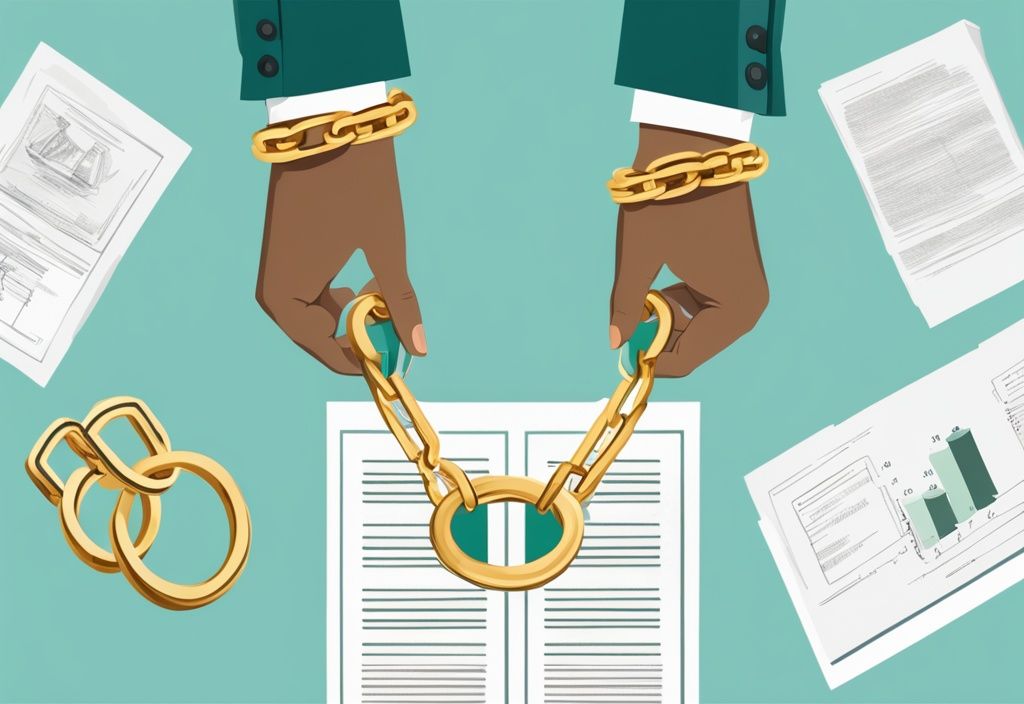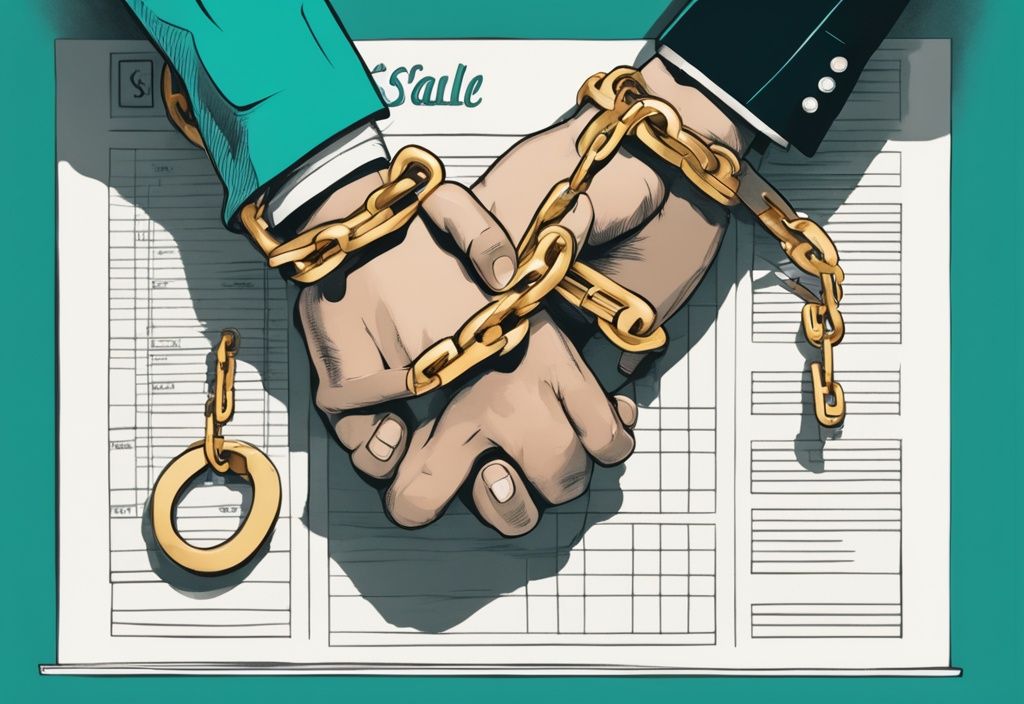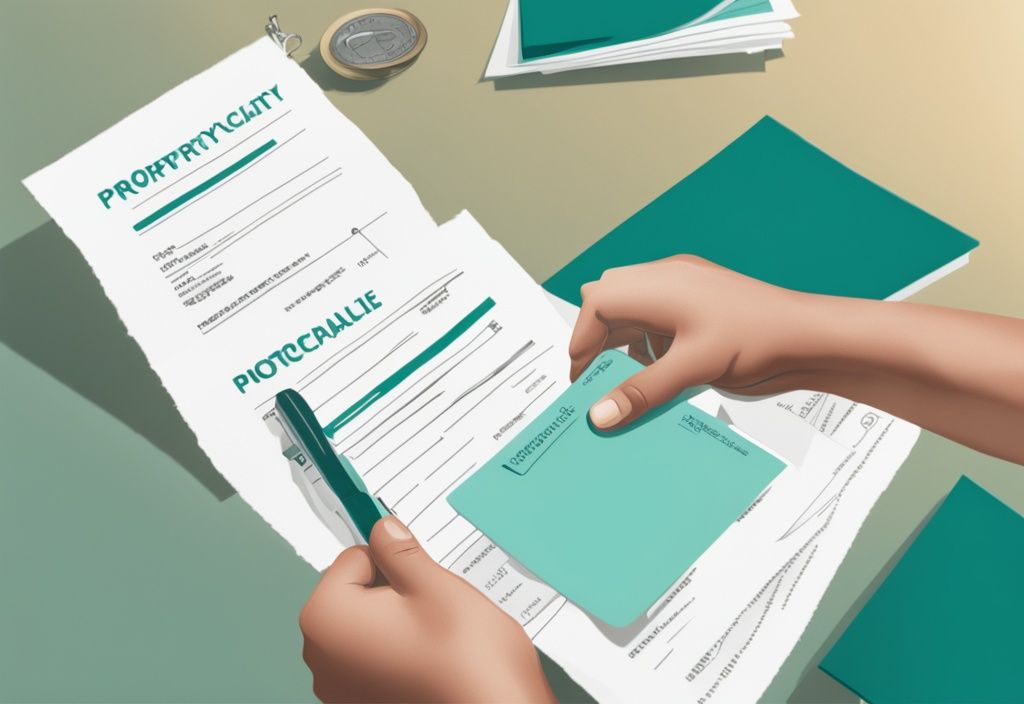
Ever wondered how you could secure a loan without losing control of your property? That’s where hypothecation in real estate comes into play – a nifty financial mechanism that achieves just that. As a seasoned real estate expert, I’ve studied and seen the power of this tool in action.
In this guide, we’re going to delve into the fascinating world of hypothecation, separating it from familiar concepts such as mortgages. We’ll discover its practical applications, spanning both residential and commercial properties, and how this underrated method could potentially supercharge your real estate investments.
Bear in mind though, like any financial tool, hypothecation comes with its own risks. I will help you navigate these waters, because making informed and confident decisions is what real estate success is all about. So, ready to unlock new financing opportunities?
Hypothecation in Real Estate: A Simple Explanation
Hypothecation in real estate refers to the practice of using an asset, typically a property, as collateral to secure a loan without transferring ownership to the lender. This process involves pledging a property as security for the loan.
While the borrower continues to own and possess the property, the lender gains the right to seize and sell it if the borrower defaults on the loan.
The primary objective of hypothecation is to provide lenders with the assurance that they will recover the loan amount, thereby reducing the lender’s risk. This collateral-based security measure allows borrowers to access financing while maintaining property ownership, making it a balanced approach for both parties involved.
The Difference Between Hypothecation and Mortgage
Hypothecation and mortgage, though similar, differ in critical aspects.
In a mortgage, the property itself serves as collateral, granting the lender the right to take possession of the home if the borrower defaults. Ownership can potentially change hands if the loan is not repaid.
Conversely, hypothecation allows the borrower to maintain both possession and use of the property while it is pledged as collateral. The lender holds a hypothecary claim on the property, as opposed to a mortgage lien in a traditional mortgage arrangement.
Unlike a pledge, where the asset is physically handed over to the lender, hypothecation ensures the borrower retains ownership and can continue to use and benefit from the asset. This distinction makes hypothecation a more flexible option for borrowers who want to retain control over their property.
Key Terms and Concepts You Need to Know
- Collateral: An asset pledged to secure a loan, providing a safety net for lenders.
- Promissory Note: A written promise to repay the loan under specified terms, outlining the repayment schedule and interest rates.
- Lien: A legal claim or right against a property, used as security for a debt, ensuring the lender has a claim on the property if the loan is not repaid.
- Deed of Trust: A document that secures a loan on a property, transferring the title to a trustee as security for the loan.
- Foreclosure: The legal process by which a lender can take possession of a property if the borrower fails to meet the loan terms, leading to the property being sold to recover the loan amount.
How Does Hypothecation Really Work?
The Crucial Role of Collateral in Hypothecation
Collateral is essential in hypothecation, significantly reducing the lender’s risk. It offers a security interest in your property, giving lenders confidence that they can recover their money even if you default. In real estate hypothecation, various properties such as residential homes and commercial buildings can serve as collateral. The key here is that the property’s value must be enough to cover the loan amount.
Imagine you’ve put up your family home as collateral. If you fail to adhere to the loan terms, the lender has the right to seize and sell the property to recoup the funds. This mechanism is a safety net for lenders, making them more open to extending credit.
Your Rights and Responsibilities as a Borrower
When you engage in hypothecation in real estate, you still own and use the property while it serves as collateral. This setup allows you to leverage your assets without giving up control. However, this right comes with the critical responsibility of repaying the loan as per the promissory note’s terms.
Failure is not an option here—missing payments can lead to foreclosure. The lender can legally seize your property to recover their money. It’s crucial to thoroughly understand your hypothecation agreement and comply with local laws and regulations. Staying informed and compliant can help you avoid severe consequences like losing your property.

Types of Collateral Used in Hypothecation
Hypothecation in real estate often involves various types of collateral. Understanding these can help you make informed decisions whether you’re a borrower or a lender. Let’s delve into the most common types used in this financial arrangement.
Using Real Estate Properties as Collateral
Real estate properties are incredibly popular as collateral in hypothecation. From your primary residence to a vacation home, and even rental properties, they offer substantial security. Commercial properties such as office buildings and retail spaces also fall into this category.
But here’s a key detail: any property used must be free from other liens or encumbrances. This clean title ensures the property can be used effectively as collateral. The next step? A professional appraisal. Why? Because it validates that the property’s value is enough to cover the loan amount.
Utilizing Financial Assets (Stocks, Bonds) as Collateral
Financial assets, including stocks, bonds, and other investments, are another viable option for collateral in hypothecation. These assets need to be liquid—easily converted to cash—so lenders can access them if a default occurs.
One of the perks here is that you retain ownership of these assets. So, if you have stocks, you’ll still earn dividends. Sounds good, right? However, remember that the lender might require extra safeguards. Why? Because financial markets are inherently volatile, and this adds an element of risk for them.
Practical Applications of Hypothecation in Real Estate
Hypothecation in Residential Real Estate
Hypothecation in real estate allows homeowners to unlock their property’s financial potential without giving up ownership. This is commonly used for securing second mortgages, home equity lines of credit (HELOCs), and home equity loans. By pledging their property as collateral, homeowners can access crucial financing while keeping ownership and usage rights. This approach is practical for funding renovations, consolidating debt, or meeting other financial needs.
Second Mortgages and Home Equity Lines of Credit (HELOCs)
Second mortgages let homeowners borrow against their home’s built-up equity. This can be useful for large expenses like home improvements or paying high-interest debt. Meanwhile, HELOCs offer a flexible revolving line of credit, secured by the home. Both financial products work on the principle of hypothecation, using the home as collateral without transferring ownership, allowing homeowners to continue benefiting from their property.
The Role of Hypothecation in Commercial Real Estate
Hypothecation is crucial in commercial real estate financing, aiding in the purchase or refinancing of properties. Businesses can access necessary funds to expand or enhance operations without disruption. By using hypothecation, lenders secure their investment with collateral, reducing their risk if the borrower defaults. This strategy ensures commercial enterprises can grow smoothly while investing in their future.
Hypothecating Investment Properties
Real estate investors often use hypothecation to secure financing for new property purchases. By hypothecating existing investment properties, like rental homes or commercial buildings, investors unlock the equity in these assets to fund new ventures. Lenders may also consider other assets, such as vehicles or additional rental properties, to secure the loan further. This tactic allows investors to maximize their potential, turning existing equity into new growth opportunities.
Understanding the Legal Aspect of Hypothecation
When delving into hypothecation in real estate, it’s essential to grasp the associated legal implications. These components can be quite intricate, involving several layers of legal documentation and compliance with various regulations. This understanding can help you navigate potential pitfalls and safeguard your financial interests when dealing with hypothecated properties.
What Happens in Case of Foreclosure?
Missing mortgage payments consecutively under hypothecation in real estate can lead to foreclosure. The lender, aiming to protect their financial stake, starts legal proceedings to claim the hypothecated property. This legal route allows the lender to recoup their loan amount by selling the property.
Now, here’s a silver lining: if the sale generates more money than the outstanding loan and related costs, those extra funds go back to you, the borrower. But, beware—this foreclosure process can significantly harm your credit score. A lower credit score can make future financing tougher, placing hurdles in your borrowing capacity.
Laws Regarding Hypothecation in Your Jurisdiction
Legalities around hypothecation in real estate aren’t uniform—they change depending on where you are. Therefore, it’s crucial to be aware of your local legal standards. Proper documentation is key; a legal hypothecation agreement filed with the appropriate authorities is a must.
Understanding local laws about debt collection and foreclosure is essential. These laws involve complex procedures, ensuring both lender and borrower rights are protected. Partnering with legal experts who know state-specific rules can be invaluable. They help you mitigate risks and ensure you’re playing by all the legal rules.
Pros of Hypothecation: Why You Should Consider it
Hypothecation in real estate offers multiple advantages, ranging from expanded financing options to lower interest rates. By pledging valuable assets as collateral without losing ownership, borrowers can leverage these benefits to achieve their financial goals more efficiently, especially when considering various types of collateral loans available in the market, which can provide substantial funds while offering lenders a level of security unparalleled by unsecured alternatives. For more information, check out this resource on collateral loans.
How Hypothecation Can Provide More Financing Options
Hypothecation in real estate allows borrowers to access funds by pledging various assets as collateral without relinquishing ownership. This financial mechanism is particularly beneficial for individuals who possess valuable assets but may not have a stellar credit history. By leveraging these assets, borrowers can secure loans that might otherwise be out of reach, offering a practical means to meet urgent financial needs or pursue investment opportunities.

Additionally, hypothecation enables incremental access to funds through flexible financial products such as Home Equity Lines of Credit (HELOCs). These lines of credit operate on a revolving basis, allowing homeowners to borrow against the value of their property as needed.
This not only provides ongoing financial security but also empowers borrowers to manage their finances more effectively. It caters to both immediate expenses and long-term aspirations, giving a balanced approach to one’s financial planning.
Benefits of Lower Interest Rates
One notable advantage of hypothecation in real estate is the potential for lower interest rates. By reducing the lender’s risk through the provision of collateral, borrowers are often offered more favorable interest rates compared to unsecured loans. This risk mitigation is appealing to lenders, making them more willing to negotiate better terms. If you’re involved in a dispute with a real estate agent, you might be wondering how much you can sue a real estate agent for to recover potential losses. Lower interest rates translate into smaller monthly payments, which can considerably reduce the overall cost of the loan.
The financial benefits don’t end there. Lower interest rates allow borrowers to allocate funds more efficiently, thereby improving their overall financial management. The reduced burden of interest payments can facilitate faster repayment of the loan, helping to free up assets sooner and reallocate resources toward other financial goals.
In essence, hypothecation in real estate not only broadens financing options but also makes borrowing more affordable. This enables a more balanced and strategic approach to financial planning.
Potential Risks of Hypothecation
The Impact of Foreclosure on Your Credit Score
Engaging in hypothecation in real estate can be risky, especially if you default on the loan. One of the most significant consequences you might face is severe damage to your credit score. Foreclosure not only stays on your credit report for several years but also dramatically lowers your score. This signals high risk to future lenders. Understanding other real estate terms, such as what a BOV is in real estate, can help you navigate the market better. The result? You may find it challenging to secure new loans, and even if you do, expect less favorable terms and higher interest rates. Unfortunately, recovering your credit score post-foreclosure is a slow process. It requires diligent financial management and consistent debt repayment to rebuild your creditworthiness. This recovery can take years, so it’s crucial to be aware of these impacts before you proceed with hypothecation.
The Consequences of Defaulting on a Hypothecated Loan
When you default on a hypothecated loan, the primary consequence is the loss of the collateralized property, which can be a significant setback. But that’s not all. The foreclosure process itself comes with substantial legal costs and additional fees, further straining your finances. These expenses can quickly add up, making a difficult situation even worse.
Moreover, beyond the financial burden, there is the emotional toll. The stress and strain associated with the foreclosure and the loss of your property can be overwhelming. This can impact not only your financial stability but also your overall well-being. It’s important to fully understand these risks before committing to a hypothecation agreement in real estate. Remember, forewarned is forearmed. Taking the time to assess all potential risks can help you make more informed decisions.
Valuable Tips for Prospective Borrowers
The Importance of Evaluating Your Repayment Ability
Before hypothecating any property, it’s critical to thoroughly assess your ability to repay the loan. Consider all your income sources and compare them against your monthly obligations. This evaluation helps determine if you’re financially ready to take on additional debt.
In the context of hypothecation in real estate, prioritizing mortgage payments over unsecured debts is essential. This approach ensures that your home remains protected while other less critical debts take a backseat. Additionally, factor in not just your current financial condition but also potential future scenarios.
Understand how forecasts like job stability and market trends might impact your ability to make timely repayments. A well-thought-out strategy can help you avoid pitfalls and keep your property secure.
Why Choosing a Reputable Lender is Crucial
In the realm of hypothecation in real estate, the choice of lender can significantly influence your financial experience. A reputable lender provides transparent terms and engages in ethical dealings, ensuring you understand every aspect of your loan agreement.
To find trustworthy lenders, extensive research is essential. This includes consulting with financial advisors and reading reviews or ratings from other borrowers. Understanding all terms and conditions provided by lenders is critically important. It prevents falling prey to predatory lending practices that can lead to unfavorable loan terms and future financial stress.
Prioritize lenders who offer clear, honest communication and have a proven track record of ethical financial practices. By doing so, you not only ensure a smoother borrowing experience but also protect yourself from potential financial pitfalls.
Leveraging Hypothecation for Real Estate Investments
Hypothecation in real estate can transform your investment strategy by leveraging existing assets to maximize returns. By using properties as collateral, you can unlock financing opportunities that open doors to acquiring foreclosures and discounted properties. This not only provides the necessary liquidity but also lets you stay competitive in a fast-paced market.

How Hypothecation Can Amplify Profits
Hypothecation in real estate can serve as a powerful tool for amplifying profits. By leveraging current assets as collateral, you unlock financing opportunities for procuring discounted or foreclosure properties. Imagine being able to secure a loan without losing control of your existing assets – it’s like having your cake and eating it too. This ready access to funds means you can move swiftly at foreclosure auctions, placing competitive bids that often translate to substantial profit margins. Understanding terms like the grandfather clause in real estate can further enhance your strategy, ensuring you’re fully equipped to make informed decisions. The ability to act quickly is crucial in real estate, especially when deals are time-sensitive. With hypothecation, you’re poised to make agile moves that keep you ahead of the game.
Strategies for Acquiring Discounted Properties Through Hypothecation
To harness the power of hypothecation for discounted property acquisitions, you should first focus on bank-owned properties typically sold below market value. Using hypothecated funds gives you a competitive edge, allowing you to secure these bargains swiftly.
Start by securing financing via promissory notes and deeds of trust to bypass the need for immediate, substantial capital outlay. This way, you’re not scrambling for funds at the last minute.
Once you’ve acquired a property, having a clear plan for managing foreclosure processes is key. Think eviction procedures, clean-up tasks, and resale activities. By ensuring each step is handled efficiently, you can optimize the property’s value and your overall investment returns.
Employing these strategies will help you fully leverage hypothecation in real estate, boosting your investment portfolio and enhancing profitability.
Conclusion
Hypothecation in real estate is a key financial strategy, allowing borrowers to secure necessary financing by leveraging their property as collateral while still holding onto ownership. This unique approach means you can continue using your property and potentially earning income from it, giving you flexibility and more financial options.
It’s crucial to understand the differences between hypothecation and a traditional mortgage. While both methods involve using real estate to secure a loan, hypothecation stands out because it allows you to maintain possession and utilitarian rights over your property. This reduces risk for lenders and doesn’t disrupt your use of the asset.
Legal implications are another vital part of hypothecation in real estate. Being familiar with the legal framework governing hypothecation in your jurisdiction can help you avoid misunderstandings and potential legal disputes. Ensure all documentation complies with state regulations, and consider seeking advice from legal experts for a smoother hypothecation process.
Recognizing the benefits and risks tied to hypothecation can lead to better financial decisions. On the plus side, borrowers often enjoy lower interest rates due to the reduced risk for lenders and gain access to financing options that might be otherwise unavailable. However, it’s important to consider the severe consequences, like foreclosure and credit score impacts, that come with defaulting.
The practical applications of hypothecation are broad, covering both residential and commercial real estate financing, as well as advanced investment strategies. Whether you’re looking to secure a second mortgage, a home equity line of credit, or finance a commercial property, hypothecation offers valuable funding options. For investors, particularly, hypothecation can boost profits by leveraging existing assets to acquire additional properties or participate in foreclosure auctions.
By carefully evaluating the terms, understanding the legalities, and choosing reputable lenders, you can effectively utilize hypothecation in real estate to meet financial needs and investment objectives. This multifaceted approach calls for a balanced outlook, considering both opportunities and challenges, to make informed decisions aligned with long-term financial plans.
Frequently Asked Questions
How Does Hypothecation Affect My Property Ownership?
When it comes to hypothecation in real estate, keeping your property is key as long as you don’t default on your loan. Think of it as a safety net – you retain ownership, and you still hold all the rights to use your property and benefit from any income it generates during the hypothecation period. This means you can continue renting it out, living in it, or even using it as a business location without any interruption, provided you stay in good standing with your mortgage payments.
What Legal Provisions Should I Be Aware of in My State Regarding Hypothecation?
Hypothecation laws in real estate can vary widely depending on where you live. Some crucial aspects to look for include how your state handles registration, the steps involved in foreclosure processes, and the protections in place for you as a borrower. It’s essential to ensure that all your documentation is in line with state regulations.
Getting advice from legal experts familiar with your local laws is highly recommended. They can help you navigate these waters and reduce your risks, making sure you’re fully informed about your rights and obligations. This way, you’ll be prepared for any potential hiccups down the road.






